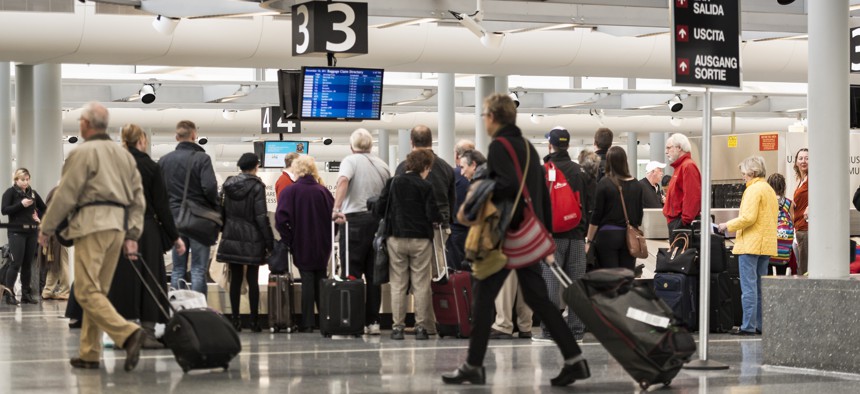Under new partnership with feds, state AGs can investigate airline complaints

John Greim/LightRocket via Getty Images
States have not been allowed to pursue air carriers for violating consumer protection laws since 1978, but a new partnership with the U.S. Department of Transportation will give attorneys general power to probe and report violations.
In the immortal words of the Rolling Stones, “You can’t always get what you want.” But state attorneys general, who have been lobbying Congress for the past two years for the ability to sue airlines in state courts for consumer protection violations, might get what they need. On Tuesday, U.S. Transportation Secretary Pete Buttigieg visited the Denver International Airport to announce a partnership with 18 states and territories that will empower AGs to help investigate airlines and hold them accountable when they violate aviation consumer protection laws.
“We take our mission to protect consumers seriously, and today's launch of the Airline Passenger Protection Partnership is an important milestone in that effort,” said Buttigieg. “By partnering with a bipartisan group of state attorneys general, the U.S. Department of Transportation has expanded our ability to hold airlines and ticket agents accountable and protect passengers from unfair or deceptive practices.”
In the three years since customers resumed flying—after largely abandoning the skies in the early days of the pandemic—several airlines have experienced widespread flight cancellations and related problems. That culminated with a meltdown of Southwest Airlines operations over the 2022 Christmas season, when the airline canceled 17,000 flights and left thousands of passengers stranded for days.
The job of responding to those widespread problems has mostly fallen to the federal government. Airlines gained a special exception from state consumer protection laws in 1978, when Congress deregulated the passenger air industry. The Airline Deregulation Act prevents state and local governments from regulating the “price, route or service of an air carrier.”
But the memoranda of understanding signed Tuesday between the Transportation Department and state AGs changes that. Under the MOU, state AGs will now investigate the airline complaints they receive and make preliminary determinations as to whether airlines violated any consumer protection laws. If they determine a law has been violated, they can refer the matter to the federal agency for review and enforcement action. To ensure airlines cooperate with state investigations, AGs also have a formal mechanism to report airlines to the Transportation Department for failure to respond to requests for information.
The participating states and territories that signed onto the MOU are California, Colorado, Connecticut, District of Columbia, Illinois, Maine, Maryland, Michigan, Nevada, New York, New Hampshire, North Carolina, the Northern Mariana Islands, Oklahoma, Pennsylvania, Rhode Island, the United States Virgin Islands and Wisconsin. In addition, another seven attorneys general have expressed an interest in doing so.
The partnership helps the Transportation Department, too. While the office that handles investigations has increased the number of attorneys and law clerks it has on staff in recent years to deal with the rise in consumer complaints, the office’s total headcount is only slightly more than 40 people. The added enforcement allows the agency to step up its own activity.
In a letter to congressional leaders a few years ago, the attorneys general of 38 states and territories wrote that their “offices have received thousands of complaints from outraged airline passengers about airline customer service—including about systematic failures to provide required credits to those who lost travel opportunities during the pandemic.”
But the state legal officers, who routinely handle consumer protection cases dealing with other industries, have little recourse to deal with aviation complaints.
“This vacuum of oversight allows airlines to mistreat consumers and leaves consumers without effective redress. Moreover, given the increased level of concentration in the airline industry and the decreased levels of competition, the ability of the marketplace to punish or reward industry behavior that harms or helps consumers is lessened, increasing the importance of effective enforcement of consumer protection requirements,” they wrote.
State AGs have urged House and Senate lawmakers to expand their authority when they reauthorize the Federal Aviation Administration, a task Congress takes up roughly once every five years. The reauthorization process is the main way that Congress makes changes to aviation policy.
Congress has still not acted on that reauthorization, punting that decision several times down the road. They now have a deadline of May 10 to reauthorize the FAA, but as it stands, neither the House nor the Senate versions of the bill grant attorneys general authority to enforce consumer airline protections.
The airline industry is one of the few that is exempt from state consumer protection laws and enforcement, Teresa Murray, the head of the consumer watchdog office for the U.S. Public Interest Research Group Education Fund, a consumer advocacy group, told Route Fifty last year.
“Eliminating federal preemption and allowing the state attorneys general to share the enforcement would give consumers more outlets to make sure that their rights are being protected,” Murray said. “If they could file complaints with their state attorney general just like they can with robocalls and medical bills and identity theft that would better protect consumers.”
Murray said attorneys general could have a big impact even if all they could enforce was federal law, rather than state laws. “They’re basically more police on the streets. The airlines should not be afraid of accountability. They don’t have to worry about new rules. They just need to follow the ones that exist right now,” she said.





